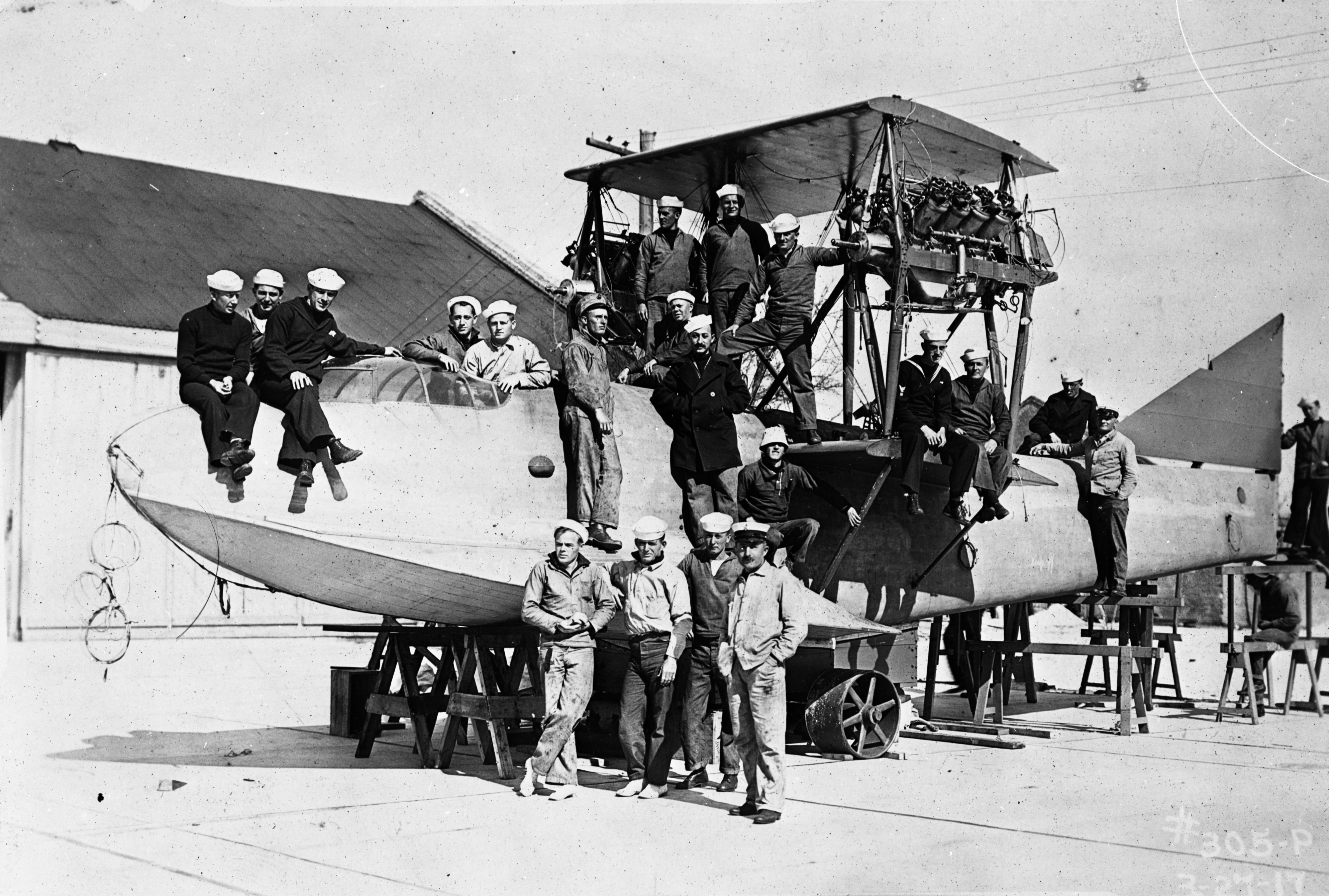Mary McLeod Bethune
Lesson Plans
Interview with Mary McLeod Bethune, ca. 1940
I had no furniture. I begged dry goods boxes and made benches and stools; begged a basin and other things I needed and in 1904 five little girls here started school.
Page 25
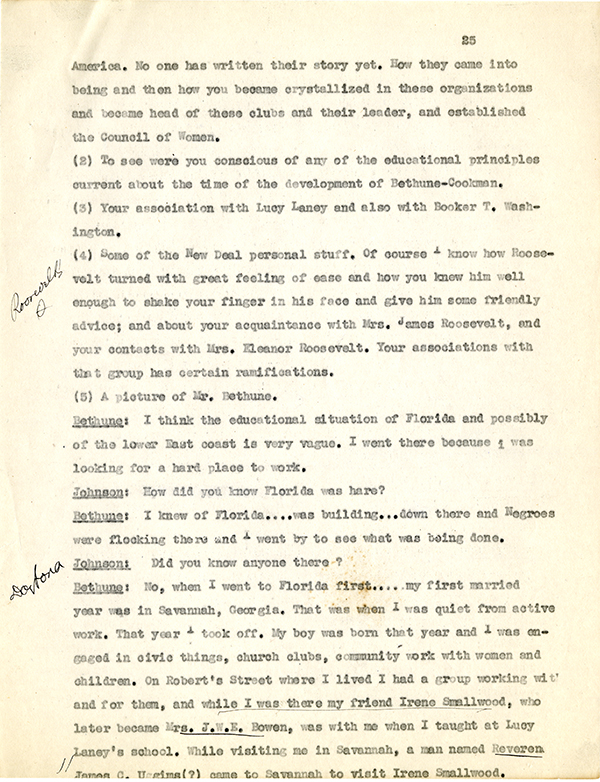
(2) To see were you conscious of any of the educational principals current about the time of the development of Bethune-Cookman.
(3) Your association with Lucy Laney and also with Booker T. Washington.
(4) Some of the New Deal personal stuff. Of course I know how Roosevelt turned with great feeling of ease and how you knew him well enough to shake your finger in his face and give him some friendly advice; and about your acquaintance with Mrs. James Roosevelt, and your contact with Mrs. Eleanor Roosevelt. Your associations with that group has certain ramifications.
(5) A picture of Mr. Bethune.
Bethune: I think the educational situation of Florida and possibly of the lower East coast is very vague. I went there because I was looking for a hard place to work.
Johnson: How did you know Florida was hard?
Bethune: I knew of Florida….was building …down there and Negroes were flocking there and I went by to see what was being done.
Johnson: Did you know anyone there?
Bethune: No, when I went to Florida first….my first married year was in Savannah, Georgia. That was when I was quiet from active work. That year I took off.
My boy was born that year and I was engaged in civic things, church clubs, community work with women and children. On Robert’s Street where I lived I had a group working with and for them, and while I was there my friend Irene Smallwood, who later became Mrs. J.W.E. Bowen, was with me when I taught at Lucy Laney’s school.
While visiting me in Savannah, a man named Reverend James C. U_gims(?) came to Savannah to visit Irene Smallwood. I met him—he was the pastor of the Presbyterian church in Palatka, Florida.
(3) Your association with Lucy Laney and also with Booker T. Washington.
(4) Some of the New Deal personal stuff. Of course I know how Roosevelt turned with great feeling of ease and how you knew him well enough to shake your finger in his face and give him some friendly advice; and about your acquaintance with Mrs. James Roosevelt, and your contact with Mrs. Eleanor Roosevelt. Your associations with that group has certain ramifications.
(5) A picture of Mr. Bethune.
Bethune: I think the educational situation of Florida and possibly of the lower East coast is very vague. I went there because I was looking for a hard place to work.
Johnson: How did you know Florida was hard?
Bethune: I knew of Florida….was building …down there and Negroes were flocking there and I went by to see what was being done.
Johnson: Did you know anyone there?
Bethune: No, when I went to Florida first….my first married year was in Savannah, Georgia. That was when I was quiet from active work. That year I took off.
My boy was born that year and I was engaged in civic things, church clubs, community work with women and children. On Robert’s Street where I lived I had a group working with and for them, and while I was there my friend Irene Smallwood, who later became Mrs. J.W.E. Bowen, was with me when I taught at Lucy Laney’s school.
While visiting me in Savannah, a man named Reverend James C. U_gims(?) came to Savannah to visit Irene Smallwood. I met him—he was the pastor of the Presbyterian church in Palatka, Florida.
Page 26
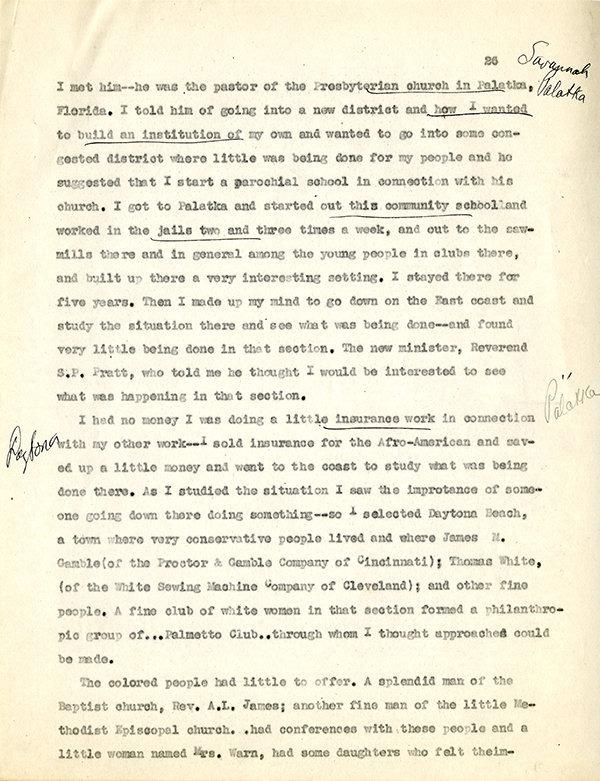
I told him of going into a new district and how I wanted to build an institution of my own and wanted to go into some congested district where little was being done for my people and he suggested that I start a parochial school in connection with his church.
I got to Palatka and started out this community school and worked in the jails two and three times a week, and our to the sawmills there and in general among the young people in clubs there, and built up there a very interesting setting. I stayed there for five years.
Then I made up my mind to go down on the East coast and study the situation there and see what was being done—and found very little being done in that section. The new minister, Reverend S.P. Pratt, who told me he thought I would be interested to see what was happening in that section.
I had no money I was doing a little insurance work in connection with my other work—I sold insurance for the Afro-American and saved up a little money and went to the coast to study what was being done there.
As I studied the situation I saw the importance of someone going down there doing something—So I selected Daytona Beach, a town where very conservative people lived and where James N. Gamble (Of the Proctor & Gamble Company of Cincinnati); Thomas White, (of the White Sewing Machine Company of Cleveland); and other fine people. A fine club of white women in that section formed a philanthropic group of…Palmetto Club..through whom I thought approaches could be made. The colored people had little to offer. A splendid man of the Baptist church, Rev. A.L. James; another fine man of the little Methodist Episcopal church…had conferences with these people and a little woman named Mrs. Warn, had some daughters who felt the importance of some one doing something in that section and gave their cooperation with my idea of starting a school. I made up my mind that I would do it and started out.
I got to Palatka and started out this community school and worked in the jails two and three times a week, and our to the sawmills there and in general among the young people in clubs there, and built up there a very interesting setting. I stayed there for five years.
Then I made up my mind to go down on the East coast and study the situation there and see what was being done—and found very little being done in that section. The new minister, Reverend S.P. Pratt, who told me he thought I would be interested to see what was happening in that section.
I had no money I was doing a little insurance work in connection with my other work—I sold insurance for the Afro-American and saved up a little money and went to the coast to study what was being done there.
As I studied the situation I saw the importance of someone going down there doing something—So I selected Daytona Beach, a town where very conservative people lived and where James N. Gamble (Of the Proctor & Gamble Company of Cincinnati); Thomas White, (of the White Sewing Machine Company of Cleveland); and other fine people. A fine club of white women in that section formed a philanthropic group of…Palmetto Club..through whom I thought approaches could be made. The colored people had little to offer. A splendid man of the Baptist church, Rev. A.L. James; another fine man of the little Methodist Episcopal church…had conferences with these people and a little woman named Mrs. Warn, had some daughters who felt the importance of some one doing something in that section and gave their cooperation with my idea of starting a school. I made up my mind that I would do it and started out.
Page 27
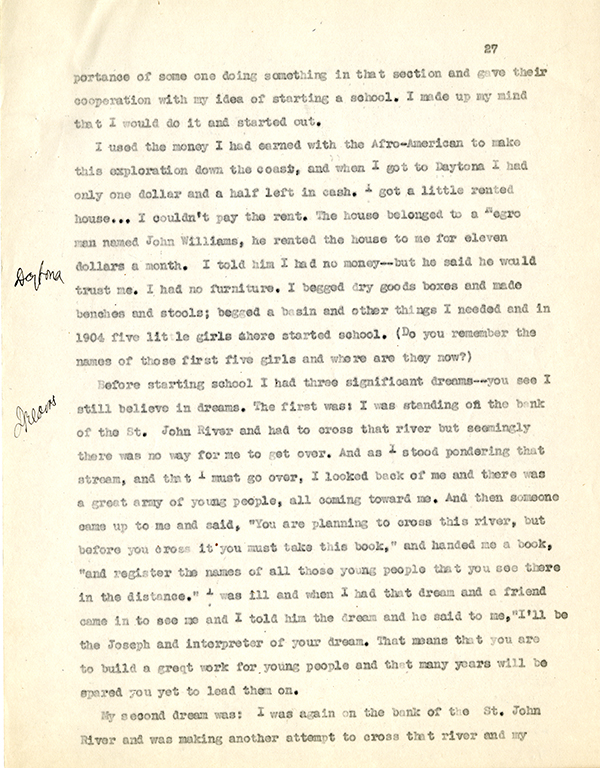
I used the money I had earned with the Afro-American to make this exploration down the coast, and when I got to Daytona I had only one dollar and a half left in cash.
I got a little rented house…I couldn’t pay the rent. The house belonged to a Negro man named John Williams, he rented the house to me for eleven dollars a month. I told him I had no money—but he said he would trust me.
I had no furniture. I begged dry goods boxes and made benches and stools; begged a basin and other things I needed and in 1904 five little girls here started school.
(Do you remember the names of those first five girls and where are they now?)
Before starting school I had three significant dreams—you see I still believe in dreams.
The first was: I was standing on the bank of the St. John River and had to cross that river but seemingly there was no way for me to get over. And as I stood pondering that stream, and that I must go over, I looked back of me and there was a great army of young people, all coming towards me.
And then someone came up to me and said, “You are planning to cross this river, but before you cross it you must take this book,” and handed me a book, “and register the names of all those young people that you see there in the distance.”
I was ill and when I had that dream and a friend came in to see me and I told him about the dream he said to me, “I’ll be the Joseph and interpreter of your dream. That means that you are to build a great work for young people and that many years will be spared you yet to lead them on.”
My second dream was: I was again on the bank of the St. John River and was making another attempt to cross that river and my mother and father were both alive then and the president of dear old Scotia, Dr. Satterfield, who was president during my stay there.
I got a little rented house…I couldn’t pay the rent. The house belonged to a Negro man named John Williams, he rented the house to me for eleven dollars a month. I told him I had no money—but he said he would trust me.
I had no furniture. I begged dry goods boxes and made benches and stools; begged a basin and other things I needed and in 1904 five little girls here started school.
(Do you remember the names of those first five girls and where are they now?)
Before starting school I had three significant dreams—you see I still believe in dreams.
The first was: I was standing on the bank of the St. John River and had to cross that river but seemingly there was no way for me to get over. And as I stood pondering that stream, and that I must go over, I looked back of me and there was a great army of young people, all coming towards me.
And then someone came up to me and said, “You are planning to cross this river, but before you cross it you must take this book,” and handed me a book, “and register the names of all those young people that you see there in the distance.”
I was ill and when I had that dream and a friend came in to see me and I told him about the dream he said to me, “I’ll be the Joseph and interpreter of your dream. That means that you are to build a great work for young people and that many years will be spared you yet to lead them on.”
My second dream was: I was again on the bank of the St. John River and was making another attempt to cross that river and my mother and father were both alive then and the president of dear old Scotia, Dr. Satterfield, who was president during my stay there.
Page 28
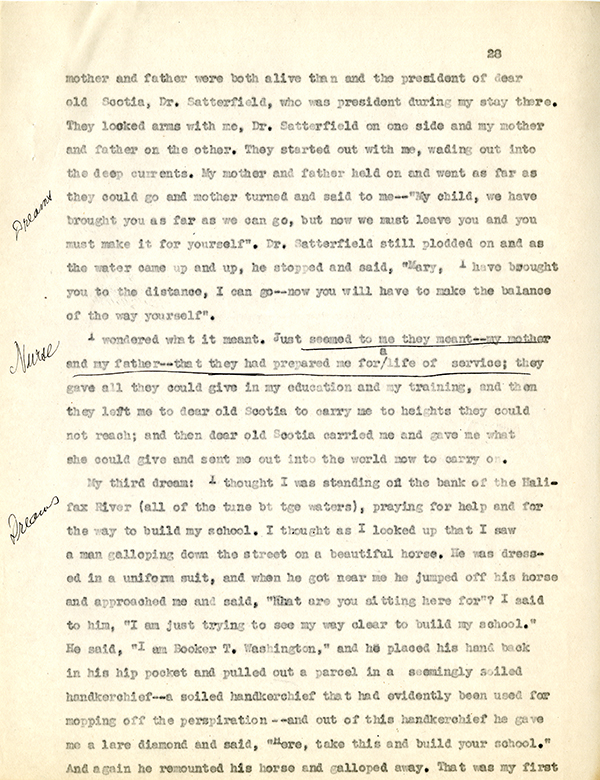
They locked arms with me, Dr. Satterfield on one side and my mother and father on the other. They started out with me, wading out into the deep currents.
My mother and father held on and went as far as they could go and mother turned and said to me—“My child, we have brought you as far as we can go, but now we must leave you and you must make it for yourself.”
Dr. Satterfield still plodded on and as the water came up and up, he stopped and said, “Mary, I have brought you to the distance, I can go now—now you will have to make the balance of the way yourself.”
I wondered what it meant. Just seemed to me they meant—my mother and by father—that they had prepared me for a life of service; they gave all they could give in my education and training, and then they left me to dear old Scotia to carry me to heights they could not reach; and then dear old Scotia carried me and gave what she could give and sent me out into the world now to carry on.
My third dream: I thought I was standing on the banks of the Halifax River (all of the ???waters), praying for help and for the way to build my school.
I thought as I looked up that I saw a man galloping down the street on a beautiful horse. He was dressed in a uniform suit, and when he got near me he jumped off his horse and approached me and said, “What are you sitting here for?”
I said to him, “I am just trying to see my way clear to build my school.”
My mother and father held on and went as far as they could go and mother turned and said to me—“My child, we have brought you as far as we can go, but now we must leave you and you must make it for yourself.”
Dr. Satterfield still plodded on and as the water came up and up, he stopped and said, “Mary, I have brought you to the distance, I can go now—now you will have to make the balance of the way yourself.”
I wondered what it meant. Just seemed to me they meant—my mother and by father—that they had prepared me for a life of service; they gave all they could give in my education and training, and then they left me to dear old Scotia to carry me to heights they could not reach; and then dear old Scotia carried me and gave what she could give and sent me out into the world now to carry on.
My third dream: I thought I was standing on the banks of the Halifax River (all of the ???waters), praying for help and for the way to build my school.
I thought as I looked up that I saw a man galloping down the street on a beautiful horse. He was dressed in a uniform suit, and when he got near me he jumped off his horse and approached me and said, “What are you sitting here for?”
I said to him, “I am just trying to see my way clear to build my school.”
Page 29
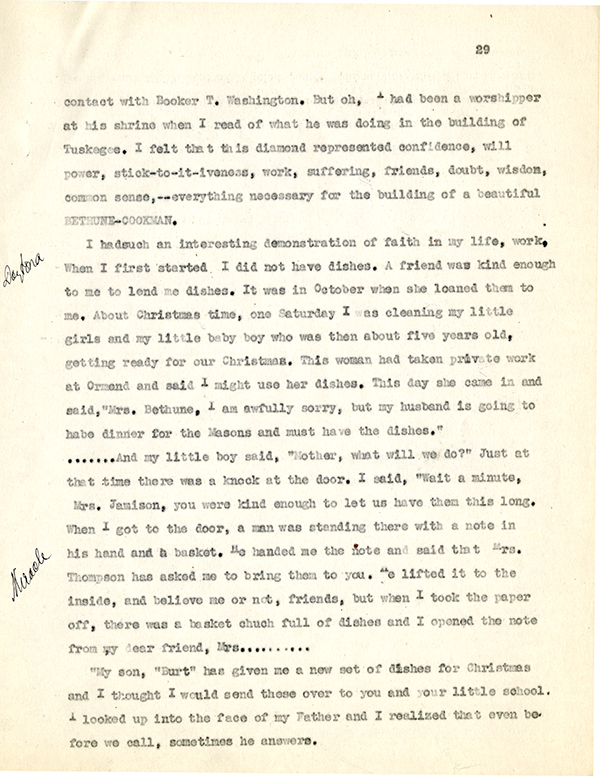
He said, “I am Booker T. Washington,” and he placed his hand back in his hip pocket and pulled out a parcel in a seemingly soiled handkerchief that had evidently been used for mopping off the perspiration –and out of this handkerchief he gave me a large diamond and said,
“Here, take this and build your school.” And again he remounted his horse and galloped away.
That was my first contact with Booker T. Washington. But oh, I had been a worshipper at his shrine when I read of what he was doing in the building of Tuskegee. I felt that this diamond represented confidence, will power, stick-to-it-iveness, work suffering, friends, doubt, wisdom, common sense,--everything necessary for the building of a beautiful BETHUNE-COOKMAN.
I had such an interesting demonstration of faith in my life, work. When I first started I did not have dishes. A friend was kind enough to me to lend me dishes. It was in October when she loaned them to me.
About Christmas time, one Saturday I was cleaning my little girls and my little baby boy who was then about five years old, getting ready for our Christmas. This woman had taken private work at Ormand and said I might use her dishes. This day she came in and said, “Mrs. Bethune, I am awfully sorry, but my husband is going to have dinner for the Masons and must have the dishes.”
…….And my little boy said, “Mother, what will we do?” Just at that time there was a knock at the door.
I said, “Wait a minute, Mrs. Jamison, you were kind enough to let us have them this long.”
When I got to the door, a man was standing there with a note in his hand and a basket. He handed me the note and said that Mrs. Thompson has asked me to bring them to you. He lifted it to the inside, and believe me or not, friends, but when I took the paper off, there was a basket chuch(sic) full of dishes and I opened the note from my dear friend Mrs……….
“My son, ‘Burt’ has given me a new set of dishes for Christmas and I thought I would send these over to you and your little school.
I looked up into the face of my Father and I realized that even before we call, sometimes he answers.
“Here, take this and build your school.” And again he remounted his horse and galloped away.
That was my first contact with Booker T. Washington. But oh, I had been a worshipper at his shrine when I read of what he was doing in the building of Tuskegee. I felt that this diamond represented confidence, will power, stick-to-it-iveness, work suffering, friends, doubt, wisdom, common sense,--everything necessary for the building of a beautiful BETHUNE-COOKMAN.
I had such an interesting demonstration of faith in my life, work. When I first started I did not have dishes. A friend was kind enough to me to lend me dishes. It was in October when she loaned them to me.
About Christmas time, one Saturday I was cleaning my little girls and my little baby boy who was then about five years old, getting ready for our Christmas. This woman had taken private work at Ormand and said I might use her dishes. This day she came in and said, “Mrs. Bethune, I am awfully sorry, but my husband is going to have dinner for the Masons and must have the dishes.”
…….And my little boy said, “Mother, what will we do?” Just at that time there was a knock at the door.
I said, “Wait a minute, Mrs. Jamison, you were kind enough to let us have them this long.”
When I got to the door, a man was standing there with a note in his hand and a basket. He handed me the note and said that Mrs. Thompson has asked me to bring them to you. He lifted it to the inside, and believe me or not, friends, but when I took the paper off, there was a basket chuch(sic) full of dishes and I opened the note from my dear friend Mrs……….
“My son, ‘Burt’ has given me a new set of dishes for Christmas and I thought I would send these over to you and your little school.
I looked up into the face of my Father and I realized that even before we call, sometimes he answers.
Page 30
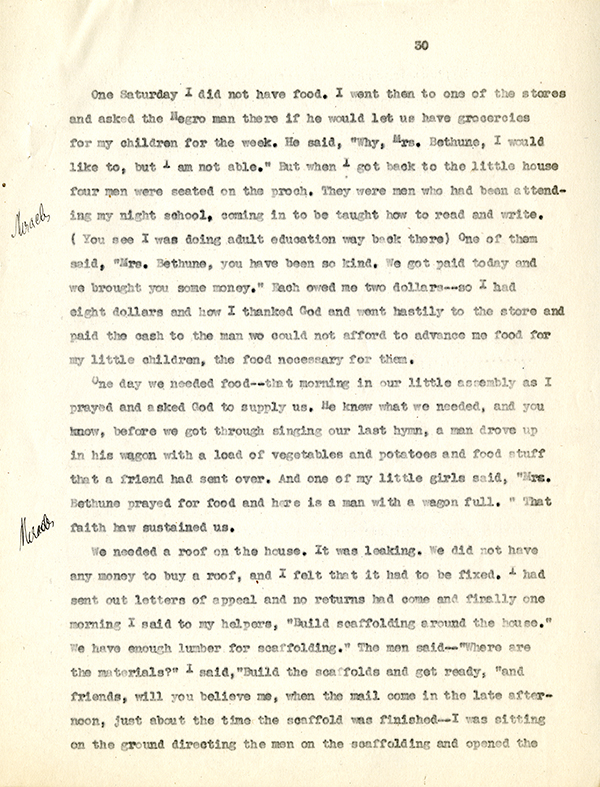
One Saturday I did not have food. I went to one of the stores and asked the Negro man there if he would let us have groceries for my children for the week.
He said, “Why Mrs. Bethune, I would like to, but I am not able.”
But when I got back to the little house four men were seated on the porch. They were men who had been attending my night school, coming in to be taught how to read and write. (You see I was doing adult education way back there)
One of them said, “Mrs. Bethune, you have been so kind. We got paid today and we brought you some money.”
Each owed me two dollars—so I had eight dollars and how I thanked God and sent hastily to the store and paid the cash to the man who could not afford to advance me food for my little children, the food necessary for them.
One day we needed food—that morning in our little assembly as I prayed and asked God to supply us. He knew what we needed, and you know, before we got through singing our last hymn, a man drove up in his wagon with a load of vegetables and potatoes and food stuff that a friend had sent over.
And one of the little girls said, “Mrs. Bethune prayed for food and here is a man with a wagon full.” That faith has sustained us.
We needed a roof on the house. It was leaking. We did not have any money to buy a roof, and I felt that it had to be fixed.
I had sent out letters of appeal and no returns had come and finally one morning I said to my helpers, “Build scaffolding around the house. We have enough lumber for scaffolding.”
The men said—“Where are the materials?”
I said, “Build the scaffolds and get ready,” and friends, will you believe me, when the mail come in the late afternoon, just about the time the scaffold was finished—I was sitting on the ground directing the men on the scaffolding and opened the mail bag right where I was sitting and will you believe me—I opened the letter from a darling friend who had sent me one thousand dollars to be used as I needed it.
He said, “Why Mrs. Bethune, I would like to, but I am not able.”
But when I got back to the little house four men were seated on the porch. They were men who had been attending my night school, coming in to be taught how to read and write. (You see I was doing adult education way back there)
One of them said, “Mrs. Bethune, you have been so kind. We got paid today and we brought you some money.”
Each owed me two dollars—so I had eight dollars and how I thanked God and sent hastily to the store and paid the cash to the man who could not afford to advance me food for my little children, the food necessary for them.
One day we needed food—that morning in our little assembly as I prayed and asked God to supply us. He knew what we needed, and you know, before we got through singing our last hymn, a man drove up in his wagon with a load of vegetables and potatoes and food stuff that a friend had sent over.
And one of the little girls said, “Mrs. Bethune prayed for food and here is a man with a wagon full.” That faith has sustained us.
We needed a roof on the house. It was leaking. We did not have any money to buy a roof, and I felt that it had to be fixed.
I had sent out letters of appeal and no returns had come and finally one morning I said to my helpers, “Build scaffolding around the house. We have enough lumber for scaffolding.”
The men said—“Where are the materials?”
I said, “Build the scaffolds and get ready,” and friends, will you believe me, when the mail come in the late afternoon, just about the time the scaffold was finished—I was sitting on the ground directing the men on the scaffolding and opened the mail bag right where I was sitting and will you believe me—I opened the letter from a darling friend who had sent me one thousand dollars to be used as I needed it.

 Listen: The Bluegrass & Old-Time Program
Listen: The Bluegrass & Old-Time Program